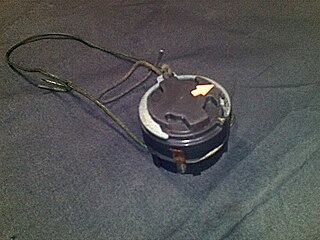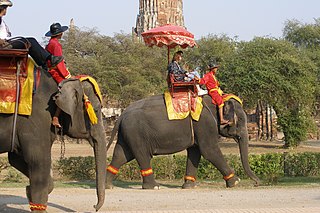Related Research Articles

Amputation is the removal of a limb by trauma, medical illness, or surgery. As a surgical measure, it is used to control pain or a disease process in the affected limb, such as malignancy or gangrene. In some cases, it is carried out on individuals as a preventive surgery for such problems. A special case is that of congenital amputation, a congenital disorder, where fetal limbs have been cut off by constrictive bands. In some countries, judicial amputation is currently used to punish people who commit crimes. Amputation has also been used as a tactic in war and acts of terrorism; it may also occur as a war injury. In some cultures and religions, minor amputations or mutilations are considered a ritual accomplishment. When done by a person, the person executing the amputation is an amputator. The oldest evidence of this practice comes from a skeleton found buried in Liang Tebo cave, East Kalimantan, Indonesian Borneo dating back to at least 31,000 years ago, where it was done when the amputee was a young child.
In medicine, a prosthesis, or a prosthetic implant, is an artificial device that replaces a missing body part, which may be lost through physical trauma, disease, or a condition present at birth. Prostheses are intended to restore the normal functions of the missing body part. A person who has undergone an amputation is sometimes referred to as an amputee, however, this term may be offensive. Rehabilitation for someone with an amputation is primarily coordinated by a physiatrist as part of an inter-disciplinary team consisting of physiatrists, prosthetists, nurses, physical therapists, and occupational therapists. Prostheses can be created by hand or with computer-aided design (CAD), a software interface that helps creators design and analyze the creation with computer-generated 2-D and 3-D graphics as well as analysis and optimization tools.
Hemicorporectomy is a radical surgery in which the body below the waist is amputated, transecting the lumbar spine. This removes the legs, the genitalia, urinary system, pelvic bones, anus, and rectum. It is a major procedure recommended only as a last resort for people with severe and potentially fatal illnesses such as osteomyelitis, tumors, severe traumas and intractable decubiti in, or around, the pelvis. By 2009, 66 cases had been reported in medical literature.
Prosthetics, the artificial replacement of organic limbs or organs, often play a role in fiction, particularly science fiction, as either plot points or to give a character a beyond normal appearance. Numerous works of literature, television, and films feature characters who have prosthetics attached.

The M14 mine "Toepopper" is a small anti-personnel land mine first deployed by the United States circa 1955. The M14 mechanism uses a belleville spring to flip a firing pin downwards into a stab detonator when pressure is applied. Once deployed, the M14 is very difficult to detect because it is a minimum metal mine, i.e. most of its components are plastic. Because of this, the design was later modified to ease mine clearance with the addition of a steel washer, glued onto the base of the mine.

The Jaipur foot, also known as the Jaipur leg, is a rubber-based prosthetic leg for people with below-knee amputations. Although inferior in many ways to the composite carbon fibre variants, its variable applicability and cost efficiency make it an acceptable choice for prosthesis. Ram Chandra Sharma and orthopedic surgeon P. K. Sethi designed and developed it in 1968.

The Other Side of the Sky: A Memoir is a memoir by Farah Ahmedi with Tamim Ansary. The book profiles the life of Farah Ahmedi from the time she was born until she was seventeen years old.
Therdchai Jivacate is a Thai orthopedic surgeon and inventor known for his humanitarian activities in providing free prosthetic limbs to impoverished amputees, and for his development of techniques allowing low-cost, high-quality prostheses to be made from local materials. The activities of the Prostheses Foundation, which he founded in 1992 under royal sponsorship from the Princess Mother Srinagarindra, have expanded beyond the borders of Thailand to Malaysia, Laos, and Burma. Jivacate has established Thailand's first and only educational institution of occupational therapy at Chiang Mai University. He has also created an educational programme for children suffering from chronic diseases at Maharaj Hospital in Nakhon Ratchasima. In 2008, he was given the Ramon Magsaysay Award for Public Service.
Amy Palmiero-Winters is a below-knee amputee, long-distance runner, and triathlete. She holds eleven world records in various events. In 2010, she was awarded the James E. Sullivan Award as the top amateur athlete in the United States and the ESPN ESPY Award as the top female athlete with a disability in the world.

Elephant Parade is an open-air exhibition dedicated to saving the Asian elephant from extinction. For one or more months, hundreds of painted elephant sculptures specially created by artists are placed in the streets of one or more host cities to increase public awareness of the plight of the elephant and gain support for Asian elephant conservation. They are then auctioned off, with the proceeds going to the Elephant Family organisation.
T43 is a disability sport classification for disability athletics, applying to athletes with "Double below knee amputation or similar disability." It includes ISOD classified athletes from the A4 and A9 classes.
The Eyes of Thailand is a 2012 documentary film directed and produced by Windy Borman and produced by Tim VandeSteeg. The film chronicles the work of Soraida Salwala, who opened the world's first elephant hospital in Lampang, Thailand and together with her team, created the world's first elephant prosthesis.
The Osseointegration Group of Australia is an Australian organisation founded by Sydney orthopedic surgeon and osseointegration specialist Munjed Al Muderis. The Osseointegration Group of Australia Team is made up of specialists from various fields including prosthetics, physio, rehabilitation, anesthesia and psychology.

The elephant has been a contributor to Thai society and its icon for many centuries. The elephant has had a considerable impact on Thai culture. The Thai elephant is the official national animal of Thailand. The elephant found in Thailand is the Indian elephant, a subspecies of the Asian elephant. In the early-20th century there were an estimated 100,000 captive elephants in Thailand. In mid-2007 there were an estimated 3,456 captive elephants left in Thailand and roughly a thousand wild elephants. By 2017 the number of captive elephants had risen to an estimated 3,783. The elephant became an endangered species in Thailand in 1986.

The Phuket Zoo was a zoo located in Phuket, Thailand. It was founded as a private zoo in 1997. The zoo was located near the Mueang Phuket district and the Phuket Bay. The zoo had been embroiled in controversy over its lack of animal welfare standards and allegations of extreme cruelty to animals.

Rosette Luyina Kiese is a Congolese athlete who competes in the shot put. After having a partial amputation of her right leg due to a landmine explosion, Luyina took up sport and competed at the 2016 Summer Paralympics in Rio de Janeiro, Brazil.

Romania sent a competitor to the 2018 Winter Paralympics in Pyeongchang, South Korea. Romania's sole competitor was Mihaita Papară, in para-snowboarding. Romania first went to the Winter Paralympics in 2010. The country has never won a medal at the Winter Games. At the 2010 and 2014 Games, Romania was represented by one skier, Laura Văleanu.

A veterinary prosthesis is a medical device that takes the place of an absent body part for an animal. These devices are created with the intention of mimicking the body part to serve the same purpose and functionality. The design of new animal prosthesis is driven by the needs of individual animals in consideration with environmental requirements and attachment sites.
References
- ↑ Khaikaew, Thaksina (30 August 1999). "Hope for elephant that stepped on landmine". Guardian. Retrieved 21 February 2011.
She stepped on the landmine nearly two weeks ago as she foraged for food during a break from hauling logs on the Burma-Thailand border, long the scene of insurgencies.
- 1 2 "Motala". มูลนิธิเพื่อนช้าง. 2022-08-11. Retrieved 2025-01-07.
- ↑ Fairley, Miki. "Sustainable O&P Fabrication for Developing Countries". The O&P Edge. Retrieved 21 February 2011.
- ↑ "Thai elephant fitted with prosthesis". The Boston Globe. Associated Press. 28 August 2005. Archived from the original on 9 January 2006. Retrieved 21 February 2011.
LAMPANG, Thailand --A Thai elephant that attracted worldwide attention when its foot was amputated after it stepped on a land mine has been fitted with a temporary prosthesis, a wildlife conservation worker said Sunday.
- ↑ Perawongmetha, Athit (30 June 2016). "Best foot forward". The Wider Image. Retrieved 9 August 2018.
- ↑ "Motala's 20th Anniversary of Healing". มูลนิธิเพื่อนช้าง. 2022-10-28. Retrieved 2025-01-07.